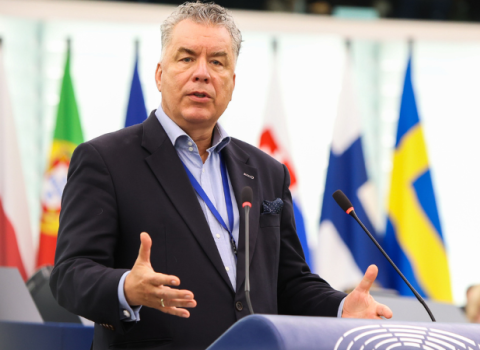Cuts during budget summit did not stop with Horizon Europe. As leaders were seeking a compromise, certain programmes - including health - took a hit, while space and defence were protected

Ursula von der Leyen and Charles Michel at the EU Council. Photo: European Commission.
The new budget deal agreed by EU leaders today will reduce the size of a wide array of programmes, including a newly proposed health programme, but safeguards budgets for defence and space research.
The deal was reached in the fifth day of a marathon summit where heads of state haggled over the EU’s long-term budget and a post-pandemic economic recovery plan.
For Europe’s research and innovation policy geeks, the headline this morning is obvious: Horizon Europe, the EU’s next research and innovation programme will receive a pared-back budget of €80.9 billion. The figure is significantly lower than a proposed €94.4 billion put forward by the European Commission in May, with the budget for the R&D programme being cut multiple times throughout the summit.
At the same time, other programmes with ambitious agendas in education, research and innovation saw significant cuts to figures proposed by the commission in May.
The EU4Health was cut down to €1.67 billion, from €9.4 billion proposed in May. The commission proposed the programme to help cope with the health consequences of COVID-19 on an EU-wide basis, rather than country-by-country. Past attempts to create a sizeable EU health programme had run afoul of member states’ insistence that the EU executive keep its nose out of their national health programmes, though only a few weeks ago it looked like COVID-19 had shifted the political momentum in the commission’s favour.
InvestEU, a scheme to boost private and public investment, could see its budget cut to €6.9 billion. In the European Commission's budget plan, the programme was to get €30.3 billion, of which €3.11 billion was ring fenced for research and innovation projects.
Erasmus+, the EU’s academic exchange programme, will be allocated €21.2 billion, about €5 billion less than initially planned. Despite the haircut, the programme will still have significantly more than it has now. In the 2014-2020 budgetary exercise, Erasmus+ was allocated €14.7 billion to help 4 million Europeans to study, train, and gain experience abroad.
The budget for Digital Europe has been agreed at €6.76 billion, less than the commission’s proposal of €8.19 billion. The programme is aimed at boosting investments in key digital technologies such as high-performance computers, artificial intelligence, and cybersecurity. Digital Europe will work in synergy with Horizon Europe and with the EU’s connectivity innovation programme (Connecting Europe Facility) to digitise the economy.
The European Defence Fund will have a budget of €7 billion, less than the commission’s proposal of €8 billion. The money will be invested in companies – both big and small – working on technologies and innovations that could improve the competitiveness of the European defence industry.
The budget for the European Space Programme was safeguarded at €13.2 billion, of which €8 billion will be invested in the satellite navigation system Galileo and €.4.81 billion for Copernicus, Europe’s earth observation programme.
The budgets for the Thermonuclear Experimental Reactor (ITER) project and Euratom remain unchanged at €5 billion and €1.8 billion respectively.





 A unique international forum for public research organisations and companies to connect their external engagement with strategic interests around their R&D system.
A unique international forum for public research organisations and companies to connect their external engagement with strategic interests around their R&D system.